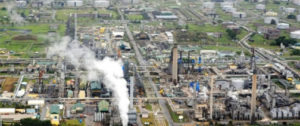
On March 12 last, Aaron Weinman of Reuters reported that Trinidad Petroleum Holdings (TPH) was in advanced debt restructuring talks with banks and had secured new loans of up to US$1.4bn based on oil reserves to ease an upcoming US$850m with a 9.75 per cent coupon rate to mature in August 2019.
One potential investor indicated that TPH would probably pay a higher coupon rate because lenders would need the oil and gas reserves as a guarantee since the company is reorganizing and is essentially a new company. One investment banker in the Caribbean said that the funding should come from the bank market because he could not see Petrotrin getting access to this money any other way.
Petrotrin was split into three entities – Heritage Petroleum, which will oversee the E&P business; Paria Fuel Trading Company; and Guaracara Refining Company – alongside holding company TPH.
TPH is meeting with rating agencies to outline a plan that prioritizes its more profitable oil and gas exploration and production (E&P) sector over oil refining, in its desire to convince investors, of the merits of its new business plan and smaller workforce, in order obtain the loans.
Reports indicate that Morgan Stanley, Credit Suisse, Panamanian trade bank Banco Latino Americano de Comercio Exterior (Bladex), First Citizens Bank and Ansa Merchants Bank are arranging approximately US$1.2bn-US$1.4bn of loans. And that the facilities will finance costs related to closing the refinery, severance pay for the 1,700 direct jobs lost last year and cover the US$850m bullet bond payment due in August.
Approximately US$400m were lent on a short-term basis, and proceeds were ring-fenced, specifically for costs related to closing the refinery and paying off retrenched staff. Recall, that the salaries for retrenched staff was approximately US$41.9mill annually, and accrued vacation due was US$33.81 mill. This means that it cost the Trinidad and Tobago government US$324.29mill. to close the refinery.
TPH has engaged Scotiabank to oversee a sale of the refinery and reports indicate that the company has received expressions of interest from a few private investors and strategic oil and gas players, including Parkland, Glencore and ExxonMobil. Let’s hope they recover that money from the sale of the refinery.
I would suggest that the Trinidad an d Tobago government consider a NNN lease deal for the refinery since this deal will retain ownership of the asset and leave the responsibility of maintenance, insurance and other expenses for the leaseholder to expense.
Reports also indicate that the Trinidad and Tobago government has guaranteed two short-term loans from local Caribbean banks, including Republic Bank. These will provide working capital credit lines valued between US$178m-US$195m in total. This decision is a good one since it allows Caribbean bankers to be involved and hopefully they will exercise some pressure on the politicians and bring some level of competency to the new company.
The Trinidad and Tobago government is now saddling its citizens with US$1.4b (TT$8.82b) in loans, that it will probably have to guarantee with its oil and gas reserves. Governments of Trinidad and Tobago, past and present, have not and are not able to manage these large enterprises because they lack the necessary knowledge and managerial skills. This project will fail and the lenders will claim our assets.
The Lashley report recommended that TPH should be a commercial entity. Espinet said: “The fact is, the State has become too all-encroaching in a lot of activities and it has crowded out a lot of people.” This arrangement defies this recommendation.
Finally, the current international environment demands that countries invest in renewable energy resources like wind, solar and hydro and geothermal. The Trinidad an d Tobago government is borrowing money to exploit a dying industry. Its largest client was the United States and today the US is the largest producer of crude oil in the world. It does not need Trinidad and Tobago’s crude and that country does not have the marketing, managerial or technical expertise to make this project economically viable.
The result will be continued devaluation of Trinidad and Tobago’s currency, lower standards of living, more unemployment and poverty in that country.


